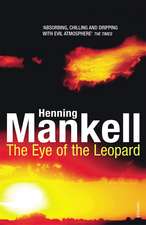A Treacherous Paradise
Autor Henning Mankellen Limba Engleză Paperback – 5 mai 2014
Cold and poverty define Hanna Renström’s childhood in remote northern Sweden, and in 1904, at nineteen, she boards a ship for Australia in hope of a better life. But none of her hopes—or fears—prepares her for the life she will lead. After two brief marriages both leave her widowed, she finds herself the owner of a bordello in Portuguese East Africa, a world where colonialism and white colonists rule, where she is isolated within white society by her profession and her gender, and, among the bordello’s black prostitutes, by her color. As Hanna’s story unfurls over the next several years in this “treacherous paradise,” she wrestles with a devastating loneliness and with the racism she’s meant to unthinkingly adopt. And as her life becomes increasingly intertwined with the prostitutes’, she moves inexorably toward the moment when she will make a decision that defies all the expectations society has of her and, more important, those she has of herself.
Gripping in its drama, evocative and searing in its portrait of colonial Africa, A Treacherous Paradise is, at its heart, a deeply moving story of a woman who manages to wrench wisdom, empathy, and grace from the most unforgiving circumstances.
Preț: 89.06 lei
Nou
Puncte Express: 134
Preț estimativ în valută:
17.04€ • 18.57$ • 14.36£
17.04€ • 18.57$ • 14.36£
Carte indisponibilă temporar
Doresc să fiu notificat când acest titlu va fi disponibil:
Se trimite...
Preluare comenzi: 021 569.72.76
Specificații
ISBN-13: 9780345802521
ISBN-10: 0345802527
Pagini: 359
Dimensiuni: 130 x 201 x 25 mm
Greutate: 0.3 kg
Editura: VINTAGE BOOKS
ISBN-10: 0345802527
Pagini: 359
Dimensiuni: 130 x 201 x 25 mm
Greutate: 0.3 kg
Editura: VINTAGE BOOKS
Recenzii
“A fascinating new novel [with] unusual flavor. It often reads like a fable of folktale . . . Reminiscent of Latin American magic realism, transplanted to Africa . . . Carlos the chimp might have come out of a Garcia Marquez novel, and the richly colored details of brothel life could be from a sprawling Jorge Amado tale. . . . [A] sensuous, beguiling tapestry.”
—William Boyd, The New York Times Book Review
“Mankell's narrative incorporates comments on racism, colonialism and the treatment of women, and his love of Africa has not blinded him to many abiding issues which he makes timelessly resonant, despite the period setting. . . . [But] Any polemical points are never foregrounded but are allowed to be grace notes in a saga of sex, race and the shifting balance of power.”
—Barry Forshaw, The Independent
“Mankell uses his deep knowledge of Mozambique’s history and politics to great advantage in this unusual and riveting story.”
—Kathy Stevenson, The Daily Mail
“Impressively deft . . . By the time it ends, readers might be surprised how far they have traveled . . . both literally and psychologically. It’s a testament to how powerfully moving and nuanced Mankell’s books can be, when he turns his attention away from corpses and world-weary detectives.”
—Doug Childers, Tampa Tribune
“[An] engrossing tale of a woman cast adrift in an alien world. . . . How she confronts the loneliness and racism of her unique place spins out in Mankell's masterful prose. As always with Mankell, the characters are brilliantly conceived.”
—Margaret Cannon, The Globe and Mail
“[An] intriguing tale . . . It keeps you guessing to the end.”
—Tina Moran, The Sunday Express
“The story is well put together and never less than absorbing.”
—Owen Richardson, The Age
“The prose (translated by Laurie Thompson) is crisp and clear yet atmospheric as it conjures tensions that would simmer for decades then explode into open rebellion. . . . This novel confirms his ability to present a central character plausibly and sympathetically, a creative talent that shines throughout this absorbing, speculative construct.”
—Philip Altbeker, The Times (South Africa)
“Considerable suspense derives from the tense atmosphere and the fact that neither Hanna nor the reader knows quite what will happen next. The tragic effects of colonialism in this divided land emerge slowly via a succession of shocking reveals. This powerful work boasts a courageous, well-drawn heroine and makes its points without stridency or didacticism. Since it's written by Mankell, an author of such high stature, it should get the large audience it deserves.”
—Sarah Johnson, Booklist
“A story as magical as a fairy tale and just about as brutal too.”
—Kirkus Reviews
“[Mankell’s] gift lies in the creation of a sequence of events that is credible and illuminating. The proverbial stranger in a strange land, Hanna is the lens that exposes the ugly realities of racism, sexism, and colonialism—easy targets, obviously, but this book is very much of a piece with Mankell’s nongenre, and more polemical works. Hanna is a curious mix of helplessness and fortitude, and her story, like the story of Africa itself, is tragically sad.”
—Publishers Weekly
—William Boyd, The New York Times Book Review
“Mankell's narrative incorporates comments on racism, colonialism and the treatment of women, and his love of Africa has not blinded him to many abiding issues which he makes timelessly resonant, despite the period setting. . . . [But] Any polemical points are never foregrounded but are allowed to be grace notes in a saga of sex, race and the shifting balance of power.”
—Barry Forshaw, The Independent
“Mankell uses his deep knowledge of Mozambique’s history and politics to great advantage in this unusual and riveting story.”
—Kathy Stevenson, The Daily Mail
“Impressively deft . . . By the time it ends, readers might be surprised how far they have traveled . . . both literally and psychologically. It’s a testament to how powerfully moving and nuanced Mankell’s books can be, when he turns his attention away from corpses and world-weary detectives.”
—Doug Childers, Tampa Tribune
“[An] engrossing tale of a woman cast adrift in an alien world. . . . How she confronts the loneliness and racism of her unique place spins out in Mankell's masterful prose. As always with Mankell, the characters are brilliantly conceived.”
—Margaret Cannon, The Globe and Mail
“[An] intriguing tale . . . It keeps you guessing to the end.”
—Tina Moran, The Sunday Express
“The story is well put together and never less than absorbing.”
—Owen Richardson, The Age
“The prose (translated by Laurie Thompson) is crisp and clear yet atmospheric as it conjures tensions that would simmer for decades then explode into open rebellion. . . . This novel confirms his ability to present a central character plausibly and sympathetically, a creative talent that shines throughout this absorbing, speculative construct.”
—Philip Altbeker, The Times (South Africa)
“Considerable suspense derives from the tense atmosphere and the fact that neither Hanna nor the reader knows quite what will happen next. The tragic effects of colonialism in this divided land emerge slowly via a succession of shocking reveals. This powerful work boasts a courageous, well-drawn heroine and makes its points without stridency or didacticism. Since it's written by Mankell, an author of such high stature, it should get the large audience it deserves.”
—Sarah Johnson, Booklist
“A story as magical as a fairy tale and just about as brutal too.”
—Kirkus Reviews
“[Mankell’s] gift lies in the creation of a sequence of events that is credible and illuminating. The proverbial stranger in a strange land, Hanna is the lens that exposes the ugly realities of racism, sexism, and colonialism—easy targets, obviously, but this book is very much of a piece with Mankell’s nongenre, and more polemical works. Hanna is a curious mix of helplessness and fortitude, and her story, like the story of Africa itself, is tragically sad.”
—Publishers Weekly
Notă biografică
Henning Mankell’s novels have been translated into forty languages and have sold more than forty million copies worldwide. He is the first winner of the Ripper Award (the new European prize for crime fiction) and has also received the Glass Key and Golden Dagger awards. His Kurt Wallander mysteries were adapted into a PBS television series starring Kenneth Branagh. Mankell divides his time between Sweden and Mozambique.
Extras
Prologue
Africa Hotel, Beira, 2002
One day in the cold month of July, 2002, a man by the name of José Paulo opened up a hole in a rotten floor. He was not trying to make an escape route nor was he looking for a hiding place, but he intended to use the damaged parquet flooring as firewood since the cold of the African winter was harsher than it had been for many years.
José Paulo was unmarried, but he had taken over responsibility for his sister and her five children after his brother-in-law, Emilio, had suddenly disappeared one morning, leaving behind nothing but a pair of worn-out shoes and a number of unpaid bills. His debts were owed almost exclusively to Donna Samima, who ran an unlicensed bar close to the harbour where she served tontonto and home-brewed beer with an astonishingly high alcohol content.
Emilio used to spend his time drinking and talking about the time in the distant past when he had worked in the South African gold mines. But many people maintained that he had never set foot in South Africa, and had certainly never held down a steady job in his life.
His disappearance was neither something expected, nor something unexpected. He had simply slunk away during the silent hours just before dawn, when everybody was asleep.
Nobody knew where he had gone to. Nor would anybody miss him all that much, not even his own family. It is doubtful whether Donna Samima missed him, but she did insist that his bills should be paid.
Emilio, the talker and drinker, made virtually no impression on anybody even when he was in the vicinity. The fact that he had now disappeared made no real difference.
José Paulo lived with his sister’s family in the Africa Hotel in Beira. There had been a time, which now seemed both distant and incomprehensible, when this establishment had been considered one of the grandest hotels in colonial Africa. It was ranked as comparable with the Victoria Falls Hotel, on the border between Southern Rhodesia and Northern Rhodesia before those countries achieved -independence and became known as Zimbabwe and Zambia.
White people came to the Africa Hotel from far and wide in order to get married, celebrate anniversaries, or simply demonstrate the fact that they belonged to an aristocracy that could never imagine that their colonial paradise would one day collapse. The hotel had been the venue for tea dances on Sunday afternoons, swing and tango competitions, and no end of people had been photographed standing outside its imposing entrance.
But the colonial dream of paradise was doomed. One day the Portuguese abandoned their last fortresses. The Africa Hotel started to crumble the moment the former owners had left. The deserted rooms and suites were occupied by poverty-stricken Africans. They deposited their few belongings in the carcasses of what used to be upright pianos and Steinway grands, in dilapidated boudoirs and bathtubs. The beautiful parquet floors were chopped up and used as firewood when winter was at its coldest.
Eventually there were several thousand people living in what had once been the Africa Hotel.
Anyway, one day in July, José Paulo made a hole in the floor and chopped up the parquet. It was freezing cold in the room. The only source of heat was an iron cauldron in which they cooked their food over an open fire. The smoke was channelled out through a smashed and badly repaired windowpane by means of an improvised
chimney.
The half-rotten flooring had already begun to smell thanks to its neglect. José thought there must be a dead rat underneath it spreading the stench of decomposition. But when he investigated, all he could find was a little notebook with a calf-leather binding.
He managed to spell out a strange name written on the black cover.
Hanna Lundmark.
Underneath the name was a year: 1905.
But he was unable to make head or tail of what was written inside it. It was in a language he didn’t recognize. He turned to old Afa-nastasio who lived further down the corridor, in room 212, and was regarded by all those packed inside the hotel as a wise man, because in his youth he had survived a confrontation with two hungry lions on a deserted road outside Chimoio.
But not even Afanastasio could read the text. He approached old Lucinda, who lived in what used to be reception, for assistance, but she didn’t know what language it was either.
Afanastasio suggested that José Paulo should throw the book away.
“It’s been lying there under the floorboards for ages,” said Afa-nastasio. “Somebody hid it there in the days when the likes of us were only allowed to enter this building in the role of waiters, cleaners or porters. No doubt this forgotten book tells an unpleasant story. Burn it. Use it as fuel when it gets really cold.”
José Paulo took the book back to his room. But he didn’t burn it, without quite knowing why. Instead he found a new hiding place for it. There was a cavity underneath the window ledge where he used to stash away any money he occasionally managed to earn. Now the few filthy banknotes could share the space with the black notebook.
He never took it out again. But he didn’t forget about it.
1
It is 1904. June. A scorching hot tropical dawn.
In this far distant here and now, a Swedish steamship lies motionless in the gentle swell. On board are thirty-one crew members, one of them a woman. Her name is Hanna Lundmark, née Renström, and she is working on board as a cook.
In all, thirty-two people were due to make the voyage to Australia with a cargo of Swedish heartwood, and planks for saloon floors and the living rooms of rich sheep farmers.
One of the crew has just died. He was a mate, and married to Hanna.
He was young, and keen to go on living. But despite being warned by Captain Svartman, he went ashore one day while they were topping up their supplies of coal in one of the desert harbours to the south of Suez. He was infected with one of the deadly fevers that are always a threat on the African coast.
When it dawned on him that he was going to die, he started howling in fear.
Neither of the men present at his deathbed—Captain Svartman and Halvorsen, the Ship’s Carpenter—could make out any last words that he uttered. He didn’t even say anything to Hanna, who was about to be widowed after a marriage lasting only one month. He died screaming and—eventually, just before the end—roaring in terror.
His name was Lars Johan Jakob Antonius Lundmark. Hanna is still mourning his death, having been devastated by what happened.
It is now dawn the day after his death. The ship is not moving. It has heaved to because there will shortly be a burial at sea. Captain Svartman does not want to delay matters. There is no ice on board to keep the corpse cold.
Hanna is standing aft with a slop pail in her hand. She is short in stature, high-breasted, with friendly eyes. Her hair is brown and gathered in a tight bun at the back of her head.
She is not beautiful. But in a strange way she radiates an aura suggesting that she is a totally genuine human being.
The here and now. She is here. On the sea, on board a steamship with two funnels. A cargo of timber, on its way to Australia. Home port: Sundsvall.
The ship is called Lovisa. She was built at the Finnboda shipyard in Stockholm. But her home port has always been on the northern Swedish coast.
She was first owned by a shipping company in Gävle, but it went bankrupt after a series of failed speculative deals. And she was then bought by a company based in Sundsvall. In Gävle she was called Matilda, after the shipowner’s wife, who played Chopin with clumsy fingers. Now she is called Lovisa, after the new owner’s youngest daughter.
One of the part-owners is called Forsman. He is the one who arranged for Hanna Lundmark to be given a job on board. Although Forsman has a piano in his house, there is nobody who can play it. Nevertheless, when the piano tuner comes on one of his regular visits, Forsman makes a point of being there to listen.
But now the mate Lars Johan Jakob Antonius Lundmark has died, killed by a raging fever.
It is as if the swell of the sea has become paralysed. The ship is lying there motionless, as if it were holding its breath.
That’s exactly what I imagine death to be like, Hanna Lundmark thought. A sudden stillness, unexpected, coming from nowhere. Death is like the wind. A sudden shift into the lee.
The lee of death. And then nothing else.
2
At that very moment Hanna is possessed by a memory. It comes from nowhere.
She recalls her father, his voice, which had become no more than a whisper by the end of his life. It was as if he were asking her to preserve and cherish what he said as a valuable secret.
A mucky angel. That’s what you are.
He said that to her just before he died. It was as if he were trying to present her with a gift, despite the fact—or maybe because of the fact—that he owned next to nothing.
Hanna Renström, my beloved daughter, you are an angel—a right mucky one, but an angel even so.
What exactly is this memory that she has? What were his exact words? Did he say she was stony, or mucky? Did he leave it up to her to choose, to decide for herself? Stony broke, or mucky? Now as she recalls that moment, she thinks he called her a mucky angel.
It is a distant memory, faded. She is so far distant from her father and his death. From there, and from then: a remote house on a bank of the cold, brown waters of the River Ljungan in the silent forests of northern Sweden. He passed away hunched up and contorted by pain on a sofa bed in a kitchen they had barely been able to keep warm.
He died surrounded by cold, she thinks. It was extremely cold in January 1899, when he stopped breathing.
That was over five years ago.
The memory of her father and his words about an angel disappear just as quickly as they came. It takes her only a few seconds to return to the present from the past.
She knows that we always make the most remarkable journeys deep down inside ourselves, where there is no time or space.
Perhaps that memory was designed to help her? To throw her the rope she needs in order to climb over the walls confining her within an atmosphere of unremitting sorrow?
But she can’t run away. The ship has been transformed into an impregnable fortress.
There is no escape. Her husband really is dead.
Death is a talon that refuses to release its grip.
3
The pressure in the boilers has been reduced. The pistons are motionless, the engines ticking over. Hanna is standing by the rail with her slop pail in her hand. She is going to empty it over the stern. The mess-room boy had wanted to take it from her when she was on her way out of the galley, but she had clung on to it, protected it. Even if this is the day she is going to watch her husband’s body being tipped into the depths of the ocean, sewn into a canvas sailcloth, she does not want to neglect her duties.
When she looks up from the pail, which is filled with eggshells, it feels as if the heat is scratching at her face. Somewhere in the mist to starboard is Africa. Although she cannot see the faintest trace of land, she thinks she can smell it.
He who is now dead has told her about it. About the steaming, almost corrosive stench of decay which you find everywhere in the tropics.
He had already made several voyages to various destinations. He had managed to learn a few things. But not the most important thing: how to survive.
He would never complete this voyage. He died at the age of twenty-four.
It’s as if he was trying to warn her, Hanna thinks. But she doesn’t know what he was warning her about. And now he’s dead.
A dead man can never answer questions.
Somebody materializes silently by her side. It’s her husband’s closest friend on board, the Norwegian carpenter Halvorsen. She doesn’t know if he has a first name, despite the fact that they have been together on the same ship for more than two months. He is never called anything but Halvorsen, a serious man who is said to go down on his knees to be readmitted into the Church every time he comes home to Brønnøysund after a few years at sea, and then signs on again when his faith can no longer sustain him.
He has large hands, but his face is kind, almost feminine. His stubble seems to have been painted on and powdered by somebody trying to be cruel to him.
“I gather there’s something you need to ask about,” he says.
His voice sings. It sounds as if he’s humming when he speaks.
“The depth,” Hanna says. “Where will Lundmark’s grave be?”
Halvorsen shakes his head doubtfully. She suddenly has the impression that he is like a restless bird about to fly away.
He leaves her without a word. But she knows he will find out the answer to her question.
How deep will the grave be? Is there a sea bottom where her husband can rest in peace, in his sewn-up canvas shroud? Or is there no bottom, does the sea continue downwards into infinity?
She empties her pail of eggshells, watches the white seabirds dive down into the water to capture their prey, then wipes the sweat from her brow with the towel she has tied to her apron.
Then she gives way to the inevitable, and screams.
Some of the birds riding the upwinds, waiting for a new slop pail to be emptied, flap their wings and strive to escape from the sorrowful howl that hits them like hailstones.
The mess-room boy Lars peers out in horror from the galley door. He is holding a cracked egg in his hand, observes her furtively. Death embarrasses him.
Needless to say, she knows what he is thinking. She’s going to jump now, she’s going to leave us because her sorrow is too great to bear.
Her scream has been heard by many on board. Two sweaty deckhands naked from the waist up stand by the side of the galley and gape at her, next to where one of the long hawsers is coiled up like a gigantic snake.
Hanna merely shakes her head, grits her teeth and goes into the galley with her empty pail. No, she is not going to climb over the rail. She has spent the whole of her life keeping a stiff upper lip, and she intends to continue doing so.
The heat of the galley hits her hard. Standing next to the stoves is similar to the life of the stokers down below in the engine room. Women in the vicinity of boilers and lighthouses bring bad luck.
The older generation of seafarers is horrified by the thought of having women on board. Their presence means trouble. And also arguments and jealousy among the men. But when shipowner Forsman announced that he wanted Hanna to join the crew, Captain Svartman agreed. He didn’t worry too much about superstition.
Hanna picks up an egg, cracks it, drops the contents into the frying pan and throws the shell into the slop pail. Thirty living sailors must have their breakfast. She tries to think only about the eggs, not about the funeral that is in the offing. She is on board as cook: that situation has not changed as a result of the death of her husband.
That’s the way it is. She is alive, but Lundmark is dead.
Africa Hotel, Beira, 2002
One day in the cold month of July, 2002, a man by the name of José Paulo opened up a hole in a rotten floor. He was not trying to make an escape route nor was he looking for a hiding place, but he intended to use the damaged parquet flooring as firewood since the cold of the African winter was harsher than it had been for many years.
José Paulo was unmarried, but he had taken over responsibility for his sister and her five children after his brother-in-law, Emilio, had suddenly disappeared one morning, leaving behind nothing but a pair of worn-out shoes and a number of unpaid bills. His debts were owed almost exclusively to Donna Samima, who ran an unlicensed bar close to the harbour where she served tontonto and home-brewed beer with an astonishingly high alcohol content.
Emilio used to spend his time drinking and talking about the time in the distant past when he had worked in the South African gold mines. But many people maintained that he had never set foot in South Africa, and had certainly never held down a steady job in his life.
His disappearance was neither something expected, nor something unexpected. He had simply slunk away during the silent hours just before dawn, when everybody was asleep.
Nobody knew where he had gone to. Nor would anybody miss him all that much, not even his own family. It is doubtful whether Donna Samima missed him, but she did insist that his bills should be paid.
Emilio, the talker and drinker, made virtually no impression on anybody even when he was in the vicinity. The fact that he had now disappeared made no real difference.
José Paulo lived with his sister’s family in the Africa Hotel in Beira. There had been a time, which now seemed both distant and incomprehensible, when this establishment had been considered one of the grandest hotels in colonial Africa. It was ranked as comparable with the Victoria Falls Hotel, on the border between Southern Rhodesia and Northern Rhodesia before those countries achieved -independence and became known as Zimbabwe and Zambia.
White people came to the Africa Hotel from far and wide in order to get married, celebrate anniversaries, or simply demonstrate the fact that they belonged to an aristocracy that could never imagine that their colonial paradise would one day collapse. The hotel had been the venue for tea dances on Sunday afternoons, swing and tango competitions, and no end of people had been photographed standing outside its imposing entrance.
But the colonial dream of paradise was doomed. One day the Portuguese abandoned their last fortresses. The Africa Hotel started to crumble the moment the former owners had left. The deserted rooms and suites were occupied by poverty-stricken Africans. They deposited their few belongings in the carcasses of what used to be upright pianos and Steinway grands, in dilapidated boudoirs and bathtubs. The beautiful parquet floors were chopped up and used as firewood when winter was at its coldest.
Eventually there were several thousand people living in what had once been the Africa Hotel.
Anyway, one day in July, José Paulo made a hole in the floor and chopped up the parquet. It was freezing cold in the room. The only source of heat was an iron cauldron in which they cooked their food over an open fire. The smoke was channelled out through a smashed and badly repaired windowpane by means of an improvised
chimney.
The half-rotten flooring had already begun to smell thanks to its neglect. José thought there must be a dead rat underneath it spreading the stench of decomposition. But when he investigated, all he could find was a little notebook with a calf-leather binding.
He managed to spell out a strange name written on the black cover.
Hanna Lundmark.
Underneath the name was a year: 1905.
But he was unable to make head or tail of what was written inside it. It was in a language he didn’t recognize. He turned to old Afa-nastasio who lived further down the corridor, in room 212, and was regarded by all those packed inside the hotel as a wise man, because in his youth he had survived a confrontation with two hungry lions on a deserted road outside Chimoio.
But not even Afanastasio could read the text. He approached old Lucinda, who lived in what used to be reception, for assistance, but she didn’t know what language it was either.
Afanastasio suggested that José Paulo should throw the book away.
“It’s been lying there under the floorboards for ages,” said Afa-nastasio. “Somebody hid it there in the days when the likes of us were only allowed to enter this building in the role of waiters, cleaners or porters. No doubt this forgotten book tells an unpleasant story. Burn it. Use it as fuel when it gets really cold.”
José Paulo took the book back to his room. But he didn’t burn it, without quite knowing why. Instead he found a new hiding place for it. There was a cavity underneath the window ledge where he used to stash away any money he occasionally managed to earn. Now the few filthy banknotes could share the space with the black notebook.
He never took it out again. But he didn’t forget about it.
1
It is 1904. June. A scorching hot tropical dawn.
In this far distant here and now, a Swedish steamship lies motionless in the gentle swell. On board are thirty-one crew members, one of them a woman. Her name is Hanna Lundmark, née Renström, and she is working on board as a cook.
In all, thirty-two people were due to make the voyage to Australia with a cargo of Swedish heartwood, and planks for saloon floors and the living rooms of rich sheep farmers.
One of the crew has just died. He was a mate, and married to Hanna.
He was young, and keen to go on living. But despite being warned by Captain Svartman, he went ashore one day while they were topping up their supplies of coal in one of the desert harbours to the south of Suez. He was infected with one of the deadly fevers that are always a threat on the African coast.
When it dawned on him that he was going to die, he started howling in fear.
Neither of the men present at his deathbed—Captain Svartman and Halvorsen, the Ship’s Carpenter—could make out any last words that he uttered. He didn’t even say anything to Hanna, who was about to be widowed after a marriage lasting only one month. He died screaming and—eventually, just before the end—roaring in terror.
His name was Lars Johan Jakob Antonius Lundmark. Hanna is still mourning his death, having been devastated by what happened.
It is now dawn the day after his death. The ship is not moving. It has heaved to because there will shortly be a burial at sea. Captain Svartman does not want to delay matters. There is no ice on board to keep the corpse cold.
Hanna is standing aft with a slop pail in her hand. She is short in stature, high-breasted, with friendly eyes. Her hair is brown and gathered in a tight bun at the back of her head.
She is not beautiful. But in a strange way she radiates an aura suggesting that she is a totally genuine human being.
The here and now. She is here. On the sea, on board a steamship with two funnels. A cargo of timber, on its way to Australia. Home port: Sundsvall.
The ship is called Lovisa. She was built at the Finnboda shipyard in Stockholm. But her home port has always been on the northern Swedish coast.
She was first owned by a shipping company in Gävle, but it went bankrupt after a series of failed speculative deals. And she was then bought by a company based in Sundsvall. In Gävle she was called Matilda, after the shipowner’s wife, who played Chopin with clumsy fingers. Now she is called Lovisa, after the new owner’s youngest daughter.
One of the part-owners is called Forsman. He is the one who arranged for Hanna Lundmark to be given a job on board. Although Forsman has a piano in his house, there is nobody who can play it. Nevertheless, when the piano tuner comes on one of his regular visits, Forsman makes a point of being there to listen.
But now the mate Lars Johan Jakob Antonius Lundmark has died, killed by a raging fever.
It is as if the swell of the sea has become paralysed. The ship is lying there motionless, as if it were holding its breath.
That’s exactly what I imagine death to be like, Hanna Lundmark thought. A sudden stillness, unexpected, coming from nowhere. Death is like the wind. A sudden shift into the lee.
The lee of death. And then nothing else.
2
At that very moment Hanna is possessed by a memory. It comes from nowhere.
She recalls her father, his voice, which had become no more than a whisper by the end of his life. It was as if he were asking her to preserve and cherish what he said as a valuable secret.
A mucky angel. That’s what you are.
He said that to her just before he died. It was as if he were trying to present her with a gift, despite the fact—or maybe because of the fact—that he owned next to nothing.
Hanna Renström, my beloved daughter, you are an angel—a right mucky one, but an angel even so.
What exactly is this memory that she has? What were his exact words? Did he say she was stony, or mucky? Did he leave it up to her to choose, to decide for herself? Stony broke, or mucky? Now as she recalls that moment, she thinks he called her a mucky angel.
It is a distant memory, faded. She is so far distant from her father and his death. From there, and from then: a remote house on a bank of the cold, brown waters of the River Ljungan in the silent forests of northern Sweden. He passed away hunched up and contorted by pain on a sofa bed in a kitchen they had barely been able to keep warm.
He died surrounded by cold, she thinks. It was extremely cold in January 1899, when he stopped breathing.
That was over five years ago.
The memory of her father and his words about an angel disappear just as quickly as they came. It takes her only a few seconds to return to the present from the past.
She knows that we always make the most remarkable journeys deep down inside ourselves, where there is no time or space.
Perhaps that memory was designed to help her? To throw her the rope she needs in order to climb over the walls confining her within an atmosphere of unremitting sorrow?
But she can’t run away. The ship has been transformed into an impregnable fortress.
There is no escape. Her husband really is dead.
Death is a talon that refuses to release its grip.
3
The pressure in the boilers has been reduced. The pistons are motionless, the engines ticking over. Hanna is standing by the rail with her slop pail in her hand. She is going to empty it over the stern. The mess-room boy had wanted to take it from her when she was on her way out of the galley, but she had clung on to it, protected it. Even if this is the day she is going to watch her husband’s body being tipped into the depths of the ocean, sewn into a canvas sailcloth, she does not want to neglect her duties.
When she looks up from the pail, which is filled with eggshells, it feels as if the heat is scratching at her face. Somewhere in the mist to starboard is Africa. Although she cannot see the faintest trace of land, she thinks she can smell it.
He who is now dead has told her about it. About the steaming, almost corrosive stench of decay which you find everywhere in the tropics.
He had already made several voyages to various destinations. He had managed to learn a few things. But not the most important thing: how to survive.
He would never complete this voyage. He died at the age of twenty-four.
It’s as if he was trying to warn her, Hanna thinks. But she doesn’t know what he was warning her about. And now he’s dead.
A dead man can never answer questions.
Somebody materializes silently by her side. It’s her husband’s closest friend on board, the Norwegian carpenter Halvorsen. She doesn’t know if he has a first name, despite the fact that they have been together on the same ship for more than two months. He is never called anything but Halvorsen, a serious man who is said to go down on his knees to be readmitted into the Church every time he comes home to Brønnøysund after a few years at sea, and then signs on again when his faith can no longer sustain him.
He has large hands, but his face is kind, almost feminine. His stubble seems to have been painted on and powdered by somebody trying to be cruel to him.
“I gather there’s something you need to ask about,” he says.
His voice sings. It sounds as if he’s humming when he speaks.
“The depth,” Hanna says. “Where will Lundmark’s grave be?”
Halvorsen shakes his head doubtfully. She suddenly has the impression that he is like a restless bird about to fly away.
He leaves her without a word. But she knows he will find out the answer to her question.
How deep will the grave be? Is there a sea bottom where her husband can rest in peace, in his sewn-up canvas shroud? Or is there no bottom, does the sea continue downwards into infinity?
She empties her pail of eggshells, watches the white seabirds dive down into the water to capture their prey, then wipes the sweat from her brow with the towel she has tied to her apron.
Then she gives way to the inevitable, and screams.
Some of the birds riding the upwinds, waiting for a new slop pail to be emptied, flap their wings and strive to escape from the sorrowful howl that hits them like hailstones.
The mess-room boy Lars peers out in horror from the galley door. He is holding a cracked egg in his hand, observes her furtively. Death embarrasses him.
Needless to say, she knows what he is thinking. She’s going to jump now, she’s going to leave us because her sorrow is too great to bear.
Her scream has been heard by many on board. Two sweaty deckhands naked from the waist up stand by the side of the galley and gape at her, next to where one of the long hawsers is coiled up like a gigantic snake.
Hanna merely shakes her head, grits her teeth and goes into the galley with her empty pail. No, she is not going to climb over the rail. She has spent the whole of her life keeping a stiff upper lip, and she intends to continue doing so.
The heat of the galley hits her hard. Standing next to the stoves is similar to the life of the stokers down below in the engine room. Women in the vicinity of boilers and lighthouses bring bad luck.
The older generation of seafarers is horrified by the thought of having women on board. Their presence means trouble. And also arguments and jealousy among the men. But when shipowner Forsman announced that he wanted Hanna to join the crew, Captain Svartman agreed. He didn’t worry too much about superstition.
Hanna picks up an egg, cracks it, drops the contents into the frying pan and throws the shell into the slop pail. Thirty living sailors must have their breakfast. She tries to think only about the eggs, not about the funeral that is in the offing. She is on board as cook: that situation has not changed as a result of the death of her husband.
That’s the way it is. She is alive, but Lundmark is dead.
Descriere
Descriere de la o altă ediție sau format:
Uncomfortable with the attitudes of the white settlers, Hanna is determined to befriend the prostitutes working for her, and change life in the town for the better, but the distrust between blacks and whites, and the shadow of colonialism, lead to tragedy and murder.
Uncomfortable with the attitudes of the white settlers, Hanna is determined to befriend the prostitutes working for her, and change life in the town for the better, but the distrust between blacks and whites, and the shadow of colonialism, lead to tragedy and murder.





















